Introduction
Problem Statement
Pakistan relationship with Russia has been one of those lost opportunities to which Pakistan could not cater due to its policy of alignment in the early years post-independence.
However, with the changing dynamics of the international system and politics, the re-shift towards Multipolarity, the failure of NATO forces in Afghanistan, the escalating importance of Central Asia, the rise of China in the global arena, the switch of states from security and military politics to geopolitics, and many other reasons, collectively amounted to the transformation of historic foes into the friends of today.

Pakistan and Russia, realizing each other’s geographic, political, economic, commercial, industrial, and geo-strategic importance, have initiated talks of cooperation towards one another, which is clearly visible in the fields of economy and military.
Objectives and Limitations
The prime objective of this study is to analyze the growing bilateral relations between Pakistan and Russia in terms of military cooperation and economic progress and calculate their impact on India’s foreign policies.
For this purpose, the paper pinpoints the bilateral and multilateral agreements, initiatives, pacts, treaties, projects, and Memorandums of Understanding (MOUs) undertaken by both parties from 2013 to 2021, in both the fields of security and economy.
The paper doesn’t talk about how Pakistan and Russia work together in areas other than those listed above. It also doesn’t talk about relations between the two countries before 2013. While conducting the research, no strict limitations were posed other than the thorough research needed to address our questions as the topic is being researched contemporarily.
Significance
The study is significant in many respects. Academically, it will present a comprehensive image of the near-historic and emerging mutual and reciprocal relations between the two important regional states which can further be used as a basis for extended research. Practically, it will be of paramount importance.
Firstly, the reader can clearly understand and analyse the extent of the alliance growing between Pakistan and Russia in economic and military sectors.

Secondly, it will portray a clear picture of the possible outcomes of the growing Pak-Russia alliance for Indian politics. Thirdly, it will also make some recommendations to improve the current status of cooperation between the two countries in other sectors as well.
Historical Background of Pakistan and Russia
During the Cold War, the relations between Pakistan and Russia, which belonged to opposite camps within the bipolar structure, were largely hostile (Amin,2016).
In light of Pakistan’s emergence on the world map, it joined the capitalist Western bloc and became a signatory of the Southeast Asia Treaty Organisation (SEATO) and the Central Treaty Organisation (CENTO) in the light of its increasing security concerns vis-à-vis India.
The Indo-Soviet Treaty of Peace
To avenge Pakistan’s decision to form an alliance with the Soviet Union’s ideological rival, it sought a de facto alliance with Pakistan’s aggressive neighbor, India, and concluded the Indo-Soviet Treaty of Peace, Friendship, and Cooperation in 1971. With Russian military, diplomatic, strategic, and economic support, India successfully defeated Pakistan in the 1971 war and cut Pakistan in two (Moskalenko, 2014).
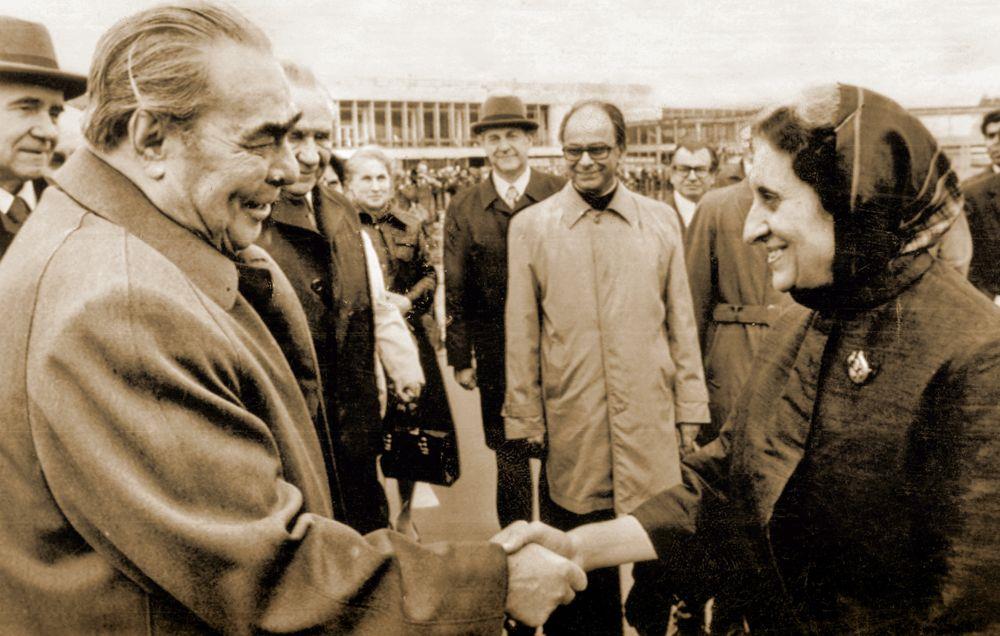
Russia and Pakistan in Afghan War
Moreover, Pakistan’s involvement in the Afghan War in 1979, backed by the United States and Saudi Arabia, further deteriorated the bilateral relations (Amin, 2016). In addition, Pakistan’s close relationship with China since the 1960s made it difficult for Islamabad to achieve rapprochement with Moscow, given the Sino-Soviet split in the Cold War (Moskalenko, 2014).

Alliance with the Taliban
However, no change in the Pak-Russian relationship was evident even after the end of the cold war. In the 1990’s civil war in Afghanistan, Pakistan allied with the Taliban regime, whereas the Russians supported the Northern Alliance. So, the two states were up against one another on a proxy battlefield as well.

President Pervez Musharraf
President Pervez Musharraf of Pakistan visited Russia in 2003, making him the first head of Pakistan since 1972 to do so. His stance on the Chechnyan issue as a “domestic concern” and negation of the accusation that Pakistan provided no support to rebel groups in Central Asia led to the reciprocation of a state level visit by the Russian Prime Minister to Pakistan in 2007 (Amin, 2016).
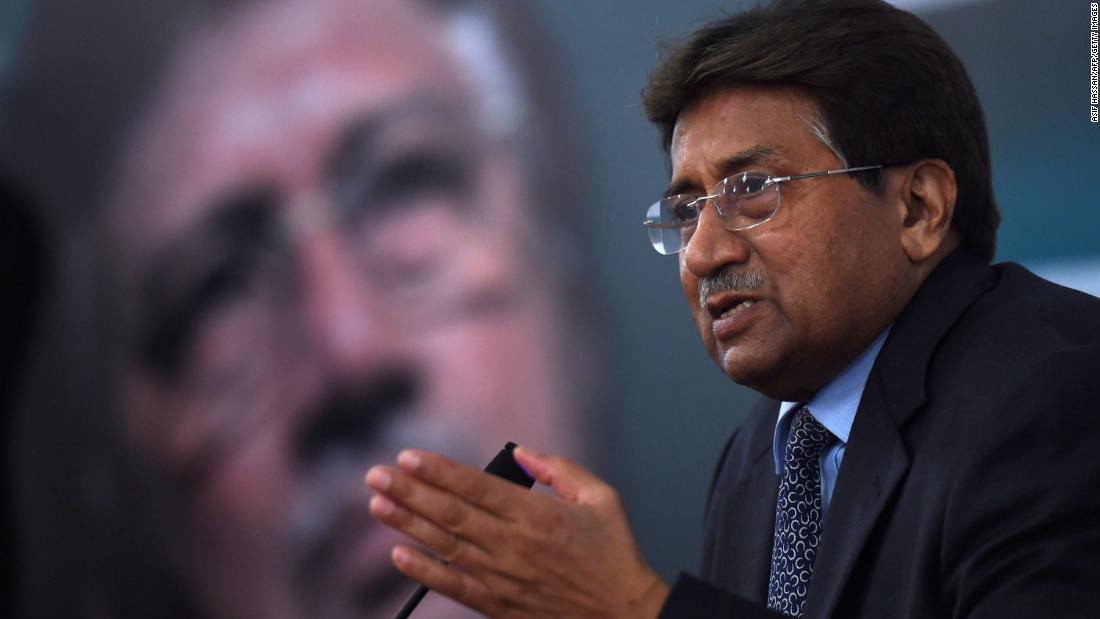
The Shanghai Cooperation Organization
In 2011, Russia expressed support for Pakistan’s full membership in the Shanghai Cooperation Organization (SCO), and the visit to Russia by President Zardari of Pakistan was realized (Moskalenko, 2014). However, it was during 2014 that the ice melted between the two states and they developed formal and cooperative bilateral relations between them, which will be further discussed in the paper.

Theoretical Framework
The shift of Russia from India to Pakistan can be accounted for through geopolitics and understood through the lens of geopolitics. In global politics, enemies and allies are now decided by how a country’s location, access to seas and ports, land connections with other countries, geographical features, topography, etc. affect the international political system and relations between countries.
Rudolf Kjellén
Coined by the Swedish political scientist, Rudolf Kjellén, at the onset of the 20th century, the term “geopolitics” is today as relevant as it was in history. World politics is still underpinned by geography that conditions the ease or difficulty of projecting power, even given technological innovations such as the Internet and aviation.
EurAsian
Globalization and technological changes modulate the significance of geography, but they do not negate it. According to Christopher Gogwilt, geopolitics today is used as “a synonym for international political relations”. The increased geostrategic location of Pakistan due to CPEC could translate into Russia’s interest in forming an “EurAsian” union and reviving its superpower status (Dugin, 1990s).

Arabian Sea
Pakistan’s access to the warm waters of the Arabian Sea, a gateway to Central and West Asia, and sharing borders with vulnerable Afghanistan, which provides Pakistan with a superior position over its affairs; all these geographic elements cumulatively reshape and revisit Russia’s policy towards Pakistan.
US-India-Israel Nexus
Another driving factor in Russian foreign policy towards Pakistan has been to “balance the threat” emerging from the growing India-US alliance. The theory suggests that states define their goals by the power of others. In order to counter the threat that might emerge from the US-India-Israel nexus, Russia is neutralizing the threat through the growing Russia-China-Pakistan bloc in order to prevent the United States’ monopoly and to preserve its interests in the region.

A Security Dilemma
As for Pakistan, the “security dilemma” created by the US-India-Israel bloc is the defining element of its foreign policy. According to Gilpin (1984), Morgenthau (1985), and Schmidt (2002), an anarchic system forces states to pursue their national interests, which constrains states to increase their security, which deteriorates the security of other states, especially the neighboring states, leading to security dilemmas. (Sultana, 2021).
Two Nuclear Weapon States
The competition of two nuclear weapon states and the adversarial relationship between India and Pakistan have already complicated the security dynamics of South Asia (Sultana, 2021). The presence of major powers further deteriorates the security situation.

The military and technological developments made by the United States and Israel in India directly threaten Pakistan and compel it to increase its reliance on Pakistan seeks alternative options for security guarantees which Russia and China offer (Sultana, 2021).
Coupled with the security dilemma, the policy change in Pakistan’s foreign affairs towards geopolitics and geoeconomics, as highlighted by the Prime Minister in Uzbekistan’s Conference of Regional Connectivity 2021, also validates her tilt towards Russia.
“Pakistan with a shift in its policy from geo-strategic to geo-economics wants to strengthen its trade and economic relations with other states (APP, 2021)”
“Facts and Findings”
Chapter 1
Economic Relations Between Pakistan and Russia (2014-2017)
Economic and diplomatic relations between Pakistan and Russia have remained moderate and, at times, unfriendly. However, since 2014, bilateral relations started growing at a slow rate, after which both countries made concerted efforts to establish the foundation for a mutually beneficial relationship.
Trade Between Pakistan and Russia
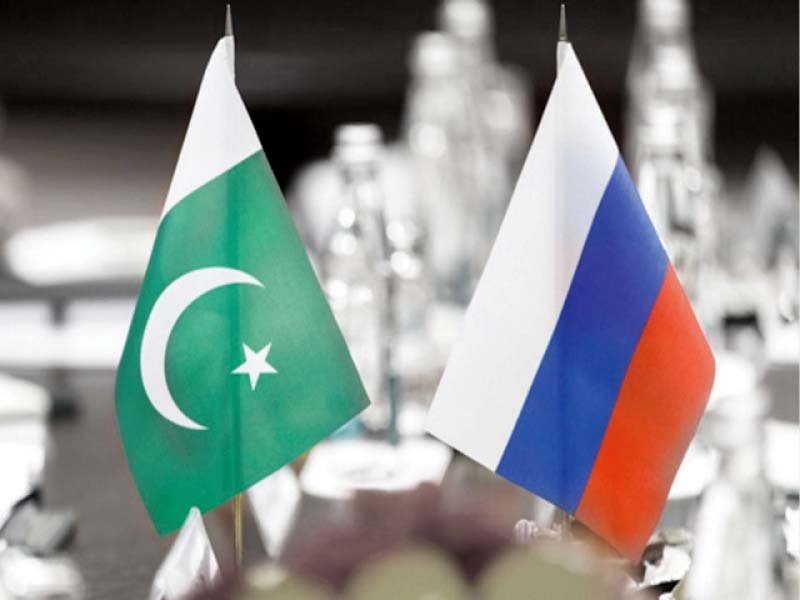
By 2014, the trade between Pakistan and Russia will have increased by six times since 2000. For the first time, the Defence Minister of the Soviet Union or Russia visited Pakistan and wrapped up a ground-breaking contract with Pakistan. Which includes, opening doors for Russian military training of Pakistani army officers, lifting the weapons embargo, taking part in the first joint exercise in order to control drug smuggling in the region and signing defence cooperation between the two countries (Kuriita, 2019).
Russia and Pakistan Construction of Pipeline
Russia and Pakistan signed an agreement for the construction of a pipeline between Karachi and Lahore in 2015. In order to overcome the shortage of Gas in the country, the gas volume of 750MMcfd-1 was given to facilitate the Pakistan system in 2015 (Business Recorder, 2010).
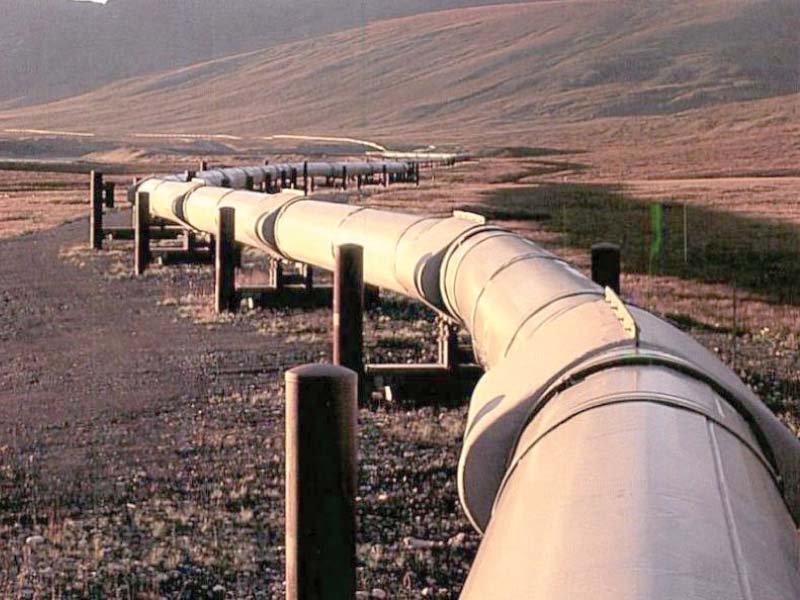
Later in 2017, two companies from Pakistan and Russia signed an agreement regarding cooperation for exploration and development and an agreement for the supply of LNG to Pakistan. (Kurita, 2019). Several opportunities could be carved out bilaterally through improved economic collaboration, joint trade and gas pipelines.
Pakistani-Russian Economic Relations (2018–2021):
Russia and Pakistan have shown significant political determination and taken steps to improve trade cooperation during the last decade. Russia enhanced relations with Pakistan after the United States announced troop withdrawals from Afghanistan beginning in 2014.
In January 2018, Pakistan’s State Bank and Russia’s Central Bank signed a memorandum of understanding on bilateral banking cooperation. As a result, bilateral trade climbed from US$442 million in 2017 to US$532 million in 2018.
Shareholders’ Agreement
Russia and Pakistan signed a shareholders’ agreement on July 15, 2021, outlining the arrangements for the construction of a US$2.5 billion (S$3.4 billion) natural gas pipeline in Pakistan (Chia,2021). This project is part of a US$14 billion (S$18.7 billion) Russian investment package in Pakistan’s energy industry in 2019 (Haiqi, 2021).
The two countries are brought together by Pakistan’s quest for economic redemption and energy supply, as well as Russia’s desire to expand its economic influence in Asia.
Four-Decade Old Trade Dispute Resolved
The conclusion in November 2019 of a four-decade trade dispute triggered by the dissolution of the Soviet Union was perhaps the strongest statement yet of mutual commitment to deepening economic ties (Chia and Haiqi, 2021).
Following negotiations that began in 2016, Pakistan paid Russia $93.5 million (S$125 million), clearing the way for a new round of economic engagement.
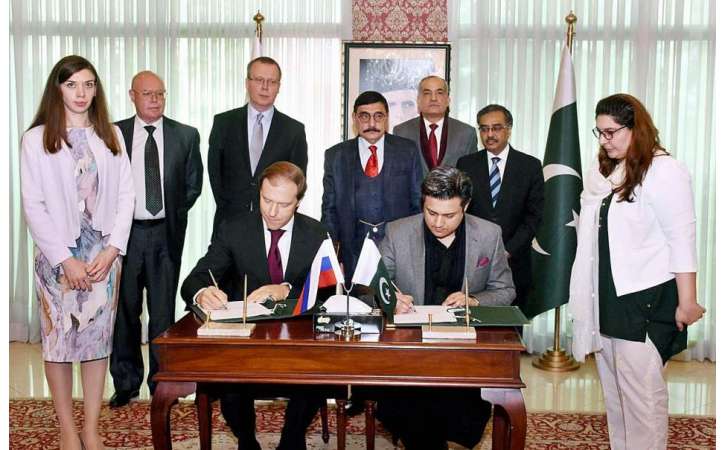
Shortly after, Russian Minister of Industry and Trade Denis Manturov led a 64-member business delegation to Islamabad for an official four-day visit to explore various areas of commercial cooperation and investment with Pakistani counterparts (Chia and Haiqi, 2021).
In 2020, bilateral trade volume reached a new high of US $790 million ($1 billion), up more than 45 percent from the previous year (Haiqi, 2021). Pakistan’s current prime minister, Imran Khan, has been involved in negotiations with Russian businessmen in Islamabad to persuade them to collaborate in the sectors of manufacturing, railways, and energy.
Chapter 2
Military Relations between Pakistan and Russia (2014-2017)
The bilateral relations between Pakistan and Russia after 9/11 were based on rationality. They acted rationally in matters involving international and regional environment and sensitivities, guided by their common strategic and military interests. Especially on the Afghanistan issue and terrorism.
Warming Bilateral Relations

In 2013, the Russian Air Chief, Viktor Bondarev, paid a state-level visit to Islamabad. In the wake of warming bilateral relations between Russia and Pakistan, the Russian defence minister, Sergei Shoigu, visited Pakistan in 2014 and concluded a military cooperation agreement, exchanged information on political and military issues, and assured mutual collaboration in the military and counter-terrorism sector. Both the states shared similar views on the Afghanistan issue.
Lifting Weapons Embargo
In the following year, further developments in military relations occurred when Russia lifted a weapons embargo on Pakistan. In 2015, the army chief of Pakistan, General Raheel Sharif, visited Russia and purchased the Mi-171E, a multi-role helicopter, and the Mi-35M, an attack helicopter. The delivery of this contract was completed in 2016 and 2017. It was now possible for Pakistan to import the RD-93 engine (used in the JF-17 Combat) directly from Russia.
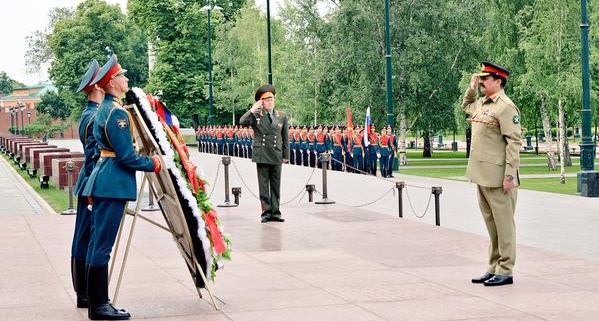
Joint Military Exercises

In the years 2016 and 2017, from September to October, joint military exercises were conducted between the armies of both states, publicly displaying military relations between both sides. Pakistan and Russia spearheaded the Aman naval exercises, and almost 35 countries, along with Russia’s largest anti-submarine warship, Severmorsk, participated in the exercise.
Military Relations between Pakistan and Russia (2018-2021)
Defence ties between Pakistan and Russia have steadily grown since both countries signed the Joint Military Consultative Committee (JMCC), which was set up in 2018 as the top bilateral forum on defence cooperation.
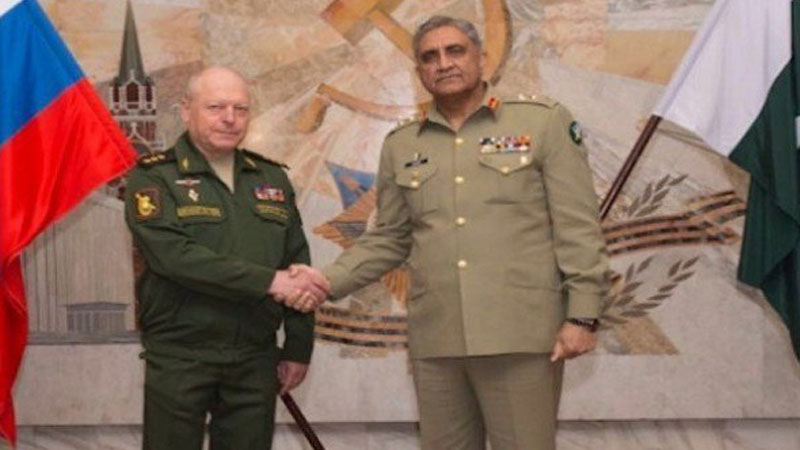
Intra-Military Delegation
In April 2018, the national security advisors of both countries held high-level security meetings in Moscow, in which both sides discussed strategic and nuclear issues (Hassan Khan, 2021). The escalated intra-military delegatory exchanges between both countries increased thereafter.
In August 2018, an MOU (memorandum of understanding) was signed between the Naval Forces of Pakistan and Russia in order to improve naval cooperation (Khan, 2021). Soon after, in September 2018, military delegations from Pakistan and India participated in the joint exercises hosted by Russia for the Shanghai Cooperation Organization (SCO).

The exercises were a symbolic gesture to portray Russia’s role as a mediator and neutraliser amidst the ongoing Indo-Pak tensions (Khan,2021).
Security Training Agreement
Pakistan and Russia also bilaterally signed the “Security Training Agreement” to initiate unilateral training programs for the military officers of Pakistan in Russian armed institutions for the very first time. This agreement was signed after the elimination of Pakistan’s involvement in America’s International Military Education Program by US president Donald Trump (Hassan Khan, 2021).
Joint Military Drills
The Second Round of Russia-Pakistan Joint Military Consultative Committee (JMCC) meetings were held in 2019 and in September 2021, the third meeting took place in Pakistan. Also, a two-week exercise in the counterterrorism domain, “Exercise Druzhba VI,” was held at the Molkino Trg area of Krasnodar, Russia, where special forces of Pakistan and Russia participated in the drill. It has also been agreed to hold the fourth round of JMCC meetings in Russia in 2022.
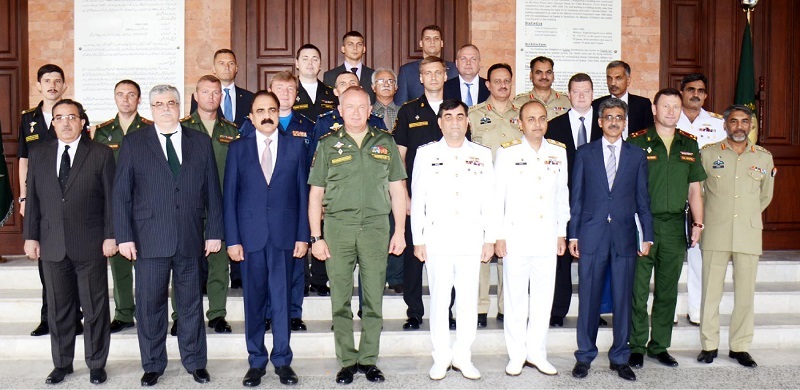
Pakistan Arms Trade with Russia
In these recent exercises and meetings, Russia has said that it is willing to support and bolster Pakistan’s counter-terrorism efforts through military assistance and also by conducting joint exercises at regular intervals between Pakistan and Russian armies (Anis and Babar, 2021).
Regarding the arms trade, Pakistan purchased four Mi-35M attack helicopters, which arrived in the country in 2018 and were commissioned into service with the army in the same year.
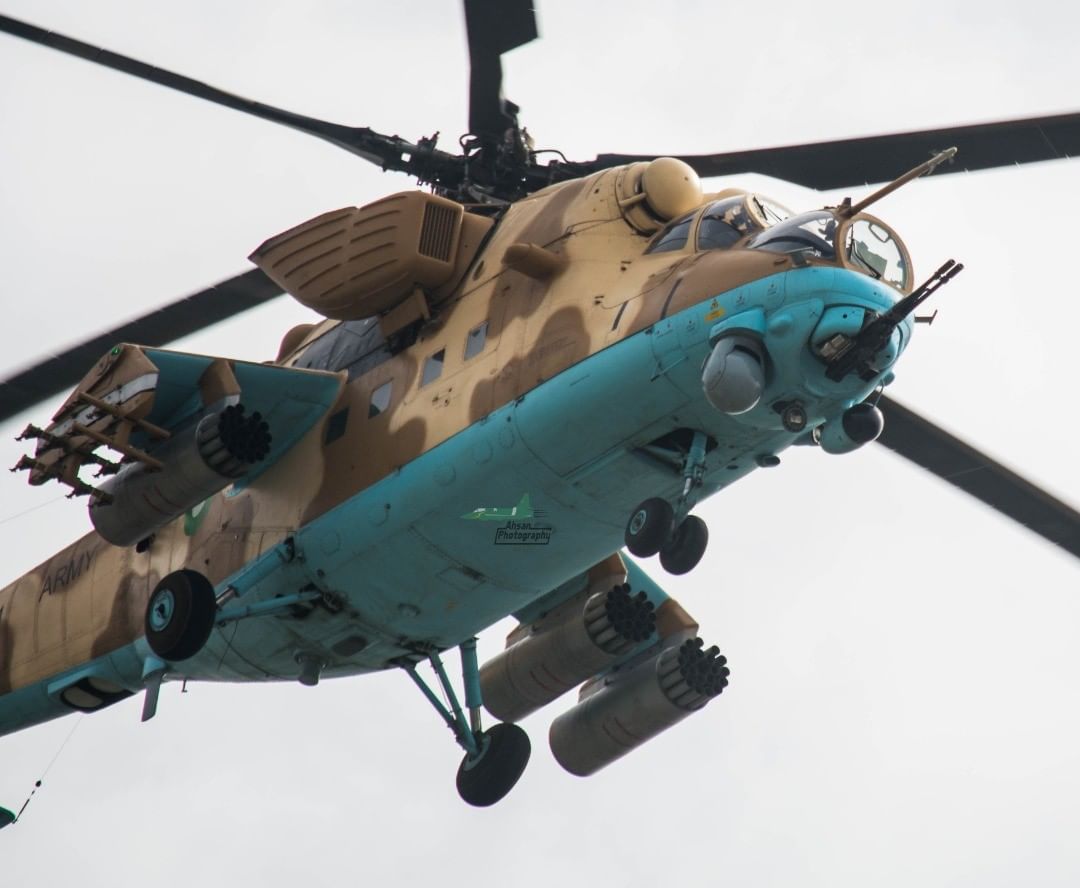
There may be further sales down the road. In a recent analysis, the Russian think tank Centre for Analysis of Strategies and Technologies (CAST) indicated that, given Pakistani military requirements and assuming Islamabad will turn to Moscow to fill them, the two could sign a $9 billion deal (Bisaccio, 2019).
This would dramatically dwarf the Mi-35M deal. The Indian media, citing sources in the Indian Ministry of Defence, reported that a range of Russian equipment could be sold, such as Pantsir surface-to-air missiles and T-90 main battle tanks.
Chapter 3
Implications for India
The building of cooperation and trust between Pakistan and Russia is a growing concern in India. If this bilateralism continues to develop at the given pace, it will surely become a bone of contention for India’s politics in the region and international system.
Pak-China-Russia Alliance
The emerging Pak-China-Russia alliance has caused concerns in New Delhi, which has caused India to neutralise the emerging threat through increasing defence cooperation with the United States and Israel.
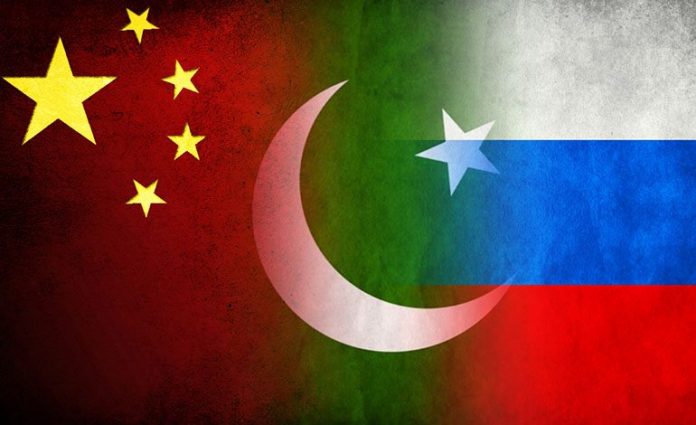
Growing Pak-Russia stakes and common interests in Afghanistan, Central Asia, and Shanghai Corporation Organisation (SCO) shall undermine India’s position in the regions.
Russia’s Policy of Balancing
Russia’s policy of balancing India and Pakistan and dealing with them on merit has caused a great setback to India’s over-reliance on Russia. A decade earlier, India’s rejection would have caused Russia to veto any decision regarding Pakistan. However, the tables have turned today. India’s objection is treated as significantly as Pakistan’s.
Due to the escalated defence corporation, Pakistan’s geo-strategic position, the China-Pak Economic Corridor (CPEC), and Pakistan’s dominance over the Afghan Taliban, Russia no longer caters to India as her sole ally in South-Asia. Her position has now been crippled, if not aborted, due to the growing geopolitical and geoeconomics.
Conclusion
Analysis
Lord Palmerston
As Lord Palmerston asserted, “There are no permanent friends or foes in international relations, only permanent interests.” This saying is again validated by the case study of Pakistan and Russia. The states, which until yesterday were involved in ideological blocs and alliances opposite to one another, are today on the same page with regard to international issues .

With the change in regional dynamics and international affairs, Pakistan and Russia both re-evaluated and redefined their interests and alliances respectively.
The huge prices Pakistan paid versus the meagre benefits it sought by being a United States partner in the War on Terror, the increasing military nexus between India-Israel-US (Security Dilemma),
Security and Survival Concerns
The security and survival concerns posed by India (Security Dilemma), along with its contemporary policy shift towards geoeconomics and the Afghan imbroglio, collectively drove Pakistan’s strategic calculus towards a premature conclusion. Pakistan had a policy of partnership towards Russian soil, which addressed all of Pakistan’s concerns.
Military Exports
As for Russia, Pakistan became an intriguing state when the United States imposed sanctions on Russian military exports and Russia wanted to explore new markets in the South Asian region not just to find a suitable buyer of her weaponry but also to neutralise India and her growing alliance with the QUAD countries.
Afghanistan Peace Process
The commonality of interests between Pakistan and Russia in the Afghanistan Peace Process, the Central Asian Energy Market, an increase in economic activity, and allying with China and the Defence Corporation against terrorism in the region brought them onto the table. The era of 2013 to 2018 was marked by a shift in foreign policy for both Russia and Pakistan.
They approached and built military relations with each other. Russia strengthened its military relations with Pakistan, approached Pakistan as a market for its arms sales, and cooperated in the areas of defense, economy, energy, and security. Simultaneously, Pakistan made Russia a military and economic ally.
Geopolitical Competition and Regional Security
The military and economic relations between Pakistan and Russia have grown on the basis of geopolitical competition and regional security in South Asia. Both states needed each other as a partner in the region. The role of Pakistan in the war on terror in Afghanistan and India as a rising power in South Asia have affected the threat perception of Pakistan.
At first, Pakistan thought of its role, as being central and primordial to the United States’ objectives in Afghanistan, but with time, Pakistan realised that America is not actually interested in Pakistan’s national and strategic interests. Pakistan understood that the U.S. and Western powers gave preference to India as a hegemonic power rather than a balance of power.
Shift In The Policy
In this type of environment, Pakistan shifted its policy towards Russia and made Russia its ally. The development of constructive relations between Russia and Pakistan is an important factor in ensuring regional stability. Pakistan is keeping its options with Russia and China open after US military support has dried up.
Russian Military Technology
Russian military technology is high-end, decidedly better than China’s and not as expensive as the West’s. So, Moscow and Islamabad are in dialogue over an arms deal that would see Pakistan procure significant amounts of Russian hardware, including surface-to-air missile systems and tanks.

As the U.S. is squeezing Russian arms exports, Moscow is eager for new markets to sell to, and Pakistan is keen to make diverse purchases.
United States ‘Sanctions
After the United States imposed sanctions on it due to the Crimea and East Ukraine crises, Russia shifted its policy towards China and South and West Asia. Afghanistan is also an important factor in Russia’s security interests in the region. South Asia is seen as a huge market opportunity for Russia to sell its weapons and is also significant for defence and cooperation.
Russia’s Curiosity in Pakistan
There are four factors that captivated Russia’s curiosity in Pakistan, CPEC (Pakistan’s growing relations with China) as the flagship of the Belt and Road Initiative.
Pakistan and Taliban

Pakistan’s influence over the Taliban. The market for Russian arms and also the Defence Corporation for Counter Terrorism (ISIS-K in Afghanistan), which made Pakistan a better option for Russians. Pakistan needs to play up smartly, patiently, and by keeping manageable expectations.
Russia’s Natural Resources
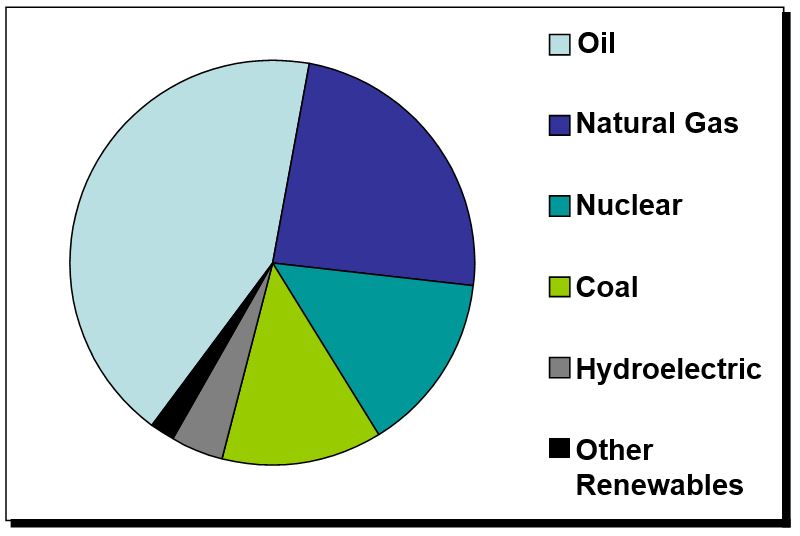
Along with military preparedness, Russia also possesses huge energy, gas, and raw material potential. Pakistan and Russia can benefit from each other’s large economic potential with enhanced cooperation and partnership (Pakistan Times, 2020). The SCO forum and the withdrawal of US forces from Afghanistan have provided both countries with great cooperation opportunities and proved that both countries can benefit from each other’s economies, along with China’s BRI project.
China’s Belt and Road Initiative (BRI)
After China’s BRI project, Pakistan secured a more prominent place in Russia’s foreign policy. Since Pakistan provides a critical route for the CPEC project, which is one of the BRI’s key prongs and provides opportunities for economic cooperation and development, which is beneficial for Russia as well (Khan, 2021).
Russia’s Economic Footprint
Pakistan can take advantage of the fact that Russia’s economic footprint in Asia is still relatively small to develop collaboration and attract Russian investment. On the 70th anniversary of Pakistan-Russia diplomatic relations, the Pakistani foreign ministry issued statements expressing optimism about the two countries’ relations. That these relations are beneficial for both the states and also for regional stability and peace.
Recommendations
Pakistan and Russia should promote this cooperation from infantry stages to next level by exploring other areas of common interest to collaborate as this partnership portrays a win-win situation for both the participants.
Pakistan and Russia should promote flexible visa policies, fully funded academic scholarships, accommodating and economic tourism strategies, bilateral sports engagements and competitions, and cultural exchanges to promote soft images towards each other’s populations and improve people to people connectivity in this respect.
Economically, the energy sector can provide huge potential for cooperation, and both parties should collectively promote their interests in the Central Asian energy market as well.
Additionally, the technological superiority of Russia in Artificial Intelligence, Hypersonic technology, and Autonomous Systems, coupled with the high-tech IT experts in Pakistan, can provide bright prospects for future collaboration which both the states should explore.
Nuclear technology is another sector where both, Russia and Pakistan can increase their potential and boost their respective economies. Nuclear weaponry, technology, warheads, submarines, missiles, etc. should be traded bilaterally.
The Co-Authors of this article are Maria Mehboob, Khaulah Fatimah Ijaz, Zohra Asif and Nizara Kabir.
My name is Lyba Mobeen. I'm currently pursuing degree of BS-International Relations at Islamic University Islamabad.







